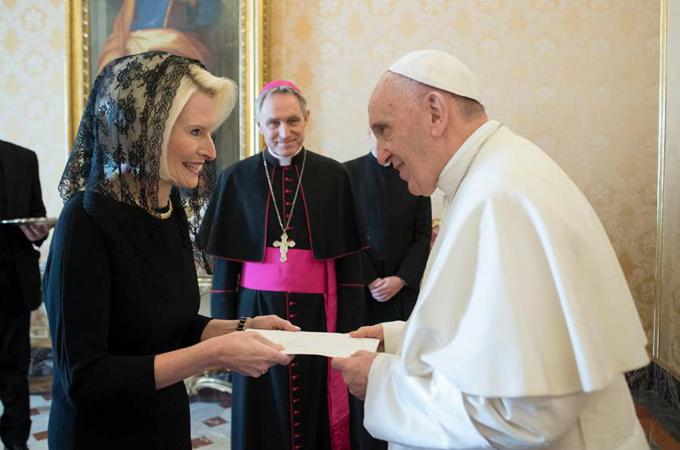The ambassador's visit to Rome's American seminary
Vatican City, Jan 10, 2018 CNA.- On Jan. 10, Callista Gingrich, the United States Ambassador to the Holy See, was a guest at the Pontifical North American College in Rome. She visited the college to receive a blessing as she embarks upon her work as ambassador, according to sources at the North American College.
News of the event is striking for two reasons.
The first reason is that her visit, and her request for a blessing, stresses the important connection between the work of the North American College as a pastoral center (it is the home to more than 200 U.S. seminarians living and studying in Rome) and the embassy which looks after the diplomatic interests of Americans in relationship with the Holy See.
Given that it is something of an unspoken tradition that the ambassador be a Catholic, the gesture of a new ambassador seeking a private blessing upon her endeavors is both paradoxical and encouraging; a symbol of the role religion can play in public life, informing and affirming public servants without contradicting their work on behalf of the secular state.
The second reason the event is significant is that it demonstrates that a pastoral welcome transcends partisan disagreement. It is all too easy for public servants to be tarred with the broad brush of the government they serve. In the case of President Trump’s administration, there have been a number of issues on which church authorities have voiced clear notes of caution and disagreement. But disagreements between the Trump administration and the US bishops have not severed the pastoral relationships essential to the Church’s mission.
It would be easy to use the occasion of an ambassador’s visit to the North American College as an opportunity to emphasize disagreement or partisan rancor. That Ambassador Gingrich was welcomed as a daughter of the Church shows the sort of personal pastoral attention which Pope Francis has placed at the heart of his papacy, and the maturity to rise above the secular partisan fray. This sort of pastoral maturity benefits everyone involved.
The Church has many occasions where she offers prayers and blessings for Catholics, and non-Catholics who want them, as they serve in public life; Red Masses are a stable feature in many countries at the opening of the judicial year, for example. Public service requires sacrifices, and carries many difficulties for those serving any government. Many Catholics who work in politics especially find that they are, sooner or later, obliged to test their terms of service against their conscience and their faith. Public service requires the constant work of discernment. Where exactly the line is, or can be, drawn between personal faith and public service is under constant scrutiny from the secular world, and is often used to push people of faith out of public life. Yet, as was seen during the confirmation of Judge Amy Barrett, it is often those who have drawn deepest from the Church’s pastoral well who can offer a most measured and dedicated contribution to public life.
Today, the Church prayed that Ambassador Gingrich will find success in her role, and prove an example to those who follow her in it. For Catholics, her visit to the North American College was a meaningful way to begin.



















